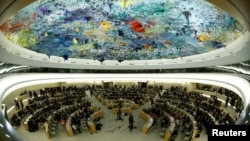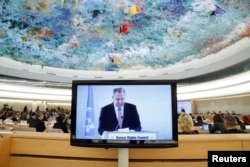Russia wasted no time in seeking to exploit the U.S. decision Wednesday to withdraw from the U.N. Human Rights Council, putting forward its candidacy for a seat on the Geneva-based body and casting the American exit as a reflection of Washington’s new unilateralist approach to global affairs.
European diplomats say their Russian counterparts — as well as Russian state media outlets — pounced quickly to portray the Kremlin as the defender of multilateralism and to couch the U.S. decision as a retreat not only from human rights but as part of a Washington bid to force international organizations into subjugation.
"Apparently, the United States wanted to turn the Council into a handy tool for promoting its interests and punishing unwanted states. In this context, the U.S. attempts to accuse almost the whole world of politicization of the Council and failure of its initiative, look cynical,” the Russian Permanent Mission to the U.N. said in its statement responding to the exit announcement.
But the Russian diplomatic offensive made no mention of its own troubles with the Human Rights Council, which since its establishment in 2006 has been mired in disputes and accusations of political bias. The HRC was set up with the mission of promoting and protecting human rights.
Russia previously served a term on the council but was denied reelection to the body in 2016 because of its indiscriminate bombing campaign of rebel-held cities in war-torn Syria and its support of the Syrian government of President Bashar al-Assad, which has been accused of widespread war crimes and gross rights violations.
It was the first time one of the permanent five members of the U.N. Security Council had failed to get elected to the HRC since its formation more than a decade ago. According to rights groups, which had agitated for Russia to lose its seat, U.N. member states sent a clear message to Moscow about the bombing in Syria and as well as its poor human rights record within its own borders.
U.N. Watch, a Geneva NGO that monitors the world body’s performance, said after the 2016 vote that “the non-election of Russia shows that the nations of the world can reject gross abusers of human rights.”
Now Washington and Moscow are locked in a battle over narratives.
The U.S. is focusing on the bias of the 47-member council and the hypocrisy of having seats occupied by countries accused of gross rights violations, including China, Cuba, Venezuela and Congo. “When a so-called human rights council cannot bring itself to address the massive abuses in Venezuela and Iran, and it welcomes the Democratic Republic of Congo as a new member, the council ceases to be worthy of its name,” U.S. ambassador to the U.N. Nikki Haley said Wednesday when announcing the American exit.
Moscow is pursuing broader themes about multilateralism and American ‘unruliness’ in a bid to turn traditional U.S. allies against Washington, say European diplomats.
Russia has used major events in recent weeks – including the annual meeting of the Shanghai Cooperation Organization (SCO) in Qingdao, China, and a meeting this month of the BRICS foreign ministers in Pretoria, – to press the case of the need to strengthen multilateralism. In a speech in Pretoria, Russian Foreign Minister Sergey Lavrov announced “our common position is that we have zero tolerance for unilateralism.”
In Shanghai, Russian President Vladimir Putin highlighted the growing friction between the U.S. and Europe. It is a theme he has pressed repeatedly in recent months, revealing a growing confidence in trying to drive a wedge between Washington and its Western allies, according to Ivan Kurilla, a history professor at the European University at St. Petersburg.
Critics of Russian policy accuse Moscow of an underlying cynicism in its rhetorical defense of multilateralism and the liberal-based international order, saying it is using it as a diplomatic weapon in geo-strategic rivalry with the West.
“Russia complains about the internal contradictions of the liberal order: sovereignty vs. intervention, pluralism vs. universality, U.S. hegemony vs. equality and democracy, although it also exploits these contradictions,” says analyst Tatiana Romania of the Italian think tank Istituto Affari Internazionali.
But some European officials fear the Russian narrative is beginning to stick in the wake of recent transatlantic trade disputes and as U.S. President Donald Trump pursues an “America First” policy. Speaking in London Thursday, NATO General-Secretary Jens Stoltenberg emphasized the importance of transatlantic ties and urged the West’s traditional allies to work to preserve the bond.






